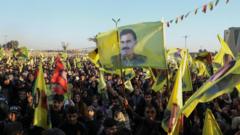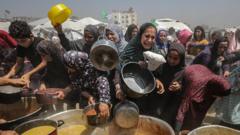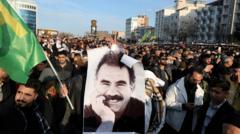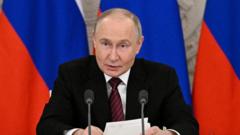The announcement by the Kurdistan Workers Party (PKK) to disband marks a pivotal moment in Turkey’s 40-year conflict with the Kurdish group, which has claimed around 40,000 lives. Despite the significance, reactions among the Kurdish populace reveal both cautious optimism and deep skepticism about the implications of this decision. Many express a longing for genuine peace, contingent on government actions such as amnesty for PKK fighters and the release of imprisoned Kurdish leaders.
**PKK's Disbandment: A New Dawn or an Empty Promise?**

**PKK's Disbandment: A New Dawn or an Empty Promise?**
After four decades of conflict, the PKK's historic step to disarm offers both hope and skepticism among Kurds and Turks alike.
The disbanding of the PKK follows a call from its jailed leader, Abdullah Ocalan, emphasizing the need for democratic solutions. While the Turkish government views the decision as a step toward a terror-free nation, individuals within Kurdish communities remain uncertain, catalyzing discussion about the future of Kurdish rights and autonomy.
The article explores divergent perspectives on this significant announcement, highlighting hopes for peace alongside concerns about historical grievances and the need for tangible steps from the Turkish government.
The historic disbandment of the PKK, which has been at the forefront of a violent struggle for Kurdish rights in Turkey, signals the end of a long-standing conflict that has left a profound impact on Turkish society. The move follows repeated calls from Ocalan, who remains imprisoned, and presents a complicated landscape where Kurds express wariness about the Turkish government’s intentions. In Diyarbakir, reactions to the disbandment vary, with some residents hopeful that peace is achievable if the government meets their demands for greater Kurdish recognition and rights. Others, however, remain disillusioned by decades of unfulfilled promises and express concern that without genuine political change and reintegration measures, the path to lasting peace remains fraught with uncertainty.
Menice, a Kurdish mother who lost sons to the conflict, reflects the emotional toll of war, emphasizing the necessity of a comprehensive peace deal that includes the release of Ocalan. Her perspective, shared by many in the community, illustrates the human cost of the protracted struggle, intertwining personal loss with broader calls for social justice and reconciliation.
Amidst a backdrop of regional shifts affecting the PKK's operational capacity, there are indications that both the Turkish government and the Kurdish movement might find common ground to secure peace. However, the road to a definitive resolution depends on real, actionable steps taken by both parties to address the enduring aspirations of the Kurdish people.
The article explores divergent perspectives on this significant announcement, highlighting hopes for peace alongside concerns about historical grievances and the need for tangible steps from the Turkish government.
The historic disbandment of the PKK, which has been at the forefront of a violent struggle for Kurdish rights in Turkey, signals the end of a long-standing conflict that has left a profound impact on Turkish society. The move follows repeated calls from Ocalan, who remains imprisoned, and presents a complicated landscape where Kurds express wariness about the Turkish government’s intentions. In Diyarbakir, reactions to the disbandment vary, with some residents hopeful that peace is achievable if the government meets their demands for greater Kurdish recognition and rights. Others, however, remain disillusioned by decades of unfulfilled promises and express concern that without genuine political change and reintegration measures, the path to lasting peace remains fraught with uncertainty.
Menice, a Kurdish mother who lost sons to the conflict, reflects the emotional toll of war, emphasizing the necessity of a comprehensive peace deal that includes the release of Ocalan. Her perspective, shared by many in the community, illustrates the human cost of the protracted struggle, intertwining personal loss with broader calls for social justice and reconciliation.
Amidst a backdrop of regional shifts affecting the PKK's operational capacity, there are indications that both the Turkish government and the Kurdish movement might find common ground to secure peace. However, the road to a definitive resolution depends on real, actionable steps taken by both parties to address the enduring aspirations of the Kurdish people.




















